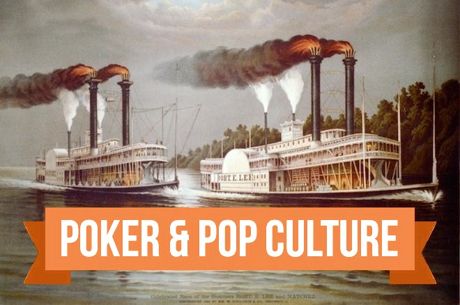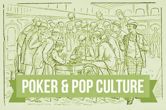Poker & Pop Culture: "It's Immoral to Let a Sucker Keep His Money"
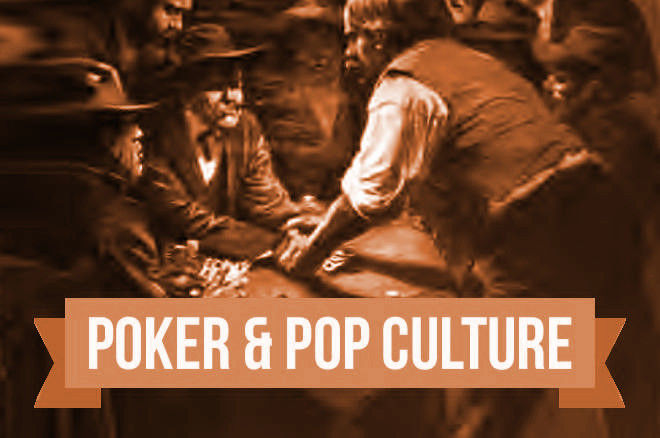
The era of the steamboat began with the start of the 19th century, with its rise in popularity and prominence in the United States essentially coinciding with the early history of poker. By the 1830s, more than 1,200 steamboats were carrying passengers, produce, and other products all over the young nation. Not surprisingly, several of the earliest poker stories date from those years as well, many of which describe games played in parlors and bars, on decks, and in private rooms aboard steamers on the Mississippi, the Ohio, or other rivers and tributaries.
The steamboat would remain a preferred mode of travel through the first half of the century and then some, ultimately to be outmoded by trains �� both faster and (of course) not water-bound �� during the latter decades of the 1800s. The railroad system grew rapidly in the United States following the Civil War, with the first transcontinental line completed in 1869. As a result, most of the famous (and notorious) steamboat poker players would abandon the rolling waters for the winding rails, as that's where most the action was to be found �� not to mention most of the travelers with money in their pockets and time to kill.
As the steamboat poker games died down, stories of the games continued to be told. Here are a few last Mississippi River poker stories before we also leave the steamboats behind.
The Man Who Brought a Knife to a Gunfight
We've already discussed Mark Twain's 1883 story "The Professor's Yarn" from his Life on the Mississippi memoir, as well as George Devol's entertaining, self-promoting 1887 autobiography Forty Years on the Mississippi.
Appearing a little later, Jack Pots: Stories of the Great American Game by Eugene Edwards provides a narrative recounting poker's history up through 1900 (the year of its publication), including an overview of the steamboat's important role in the story.
Edwards reflects early on how before the railroads came to prominence and the "gangs of professional gamblers" and "sharpers" began to work the trains in earnest, the poker action aboard the steamboats was nonstop.
"It was nothing unusual for an open game to be run in the saloon all day and night from the time the boat left the wharf on the upper river until she landed at her destination," explains Edwards. "Private coteries were made up and played twenty-four hours at a stretch, the deck hands had their games at intervals and the pilot at the wheel took a hand when he was off duty," he continues.
"In short, everybody played or looked on, ready to play at the first chance, if they had the money."
Edwards characterizes the steamboats during their heyday as "the paradise of the professional poker player." As we've already covered, such "professionals" weren't above gaining an unfair advantage if they could, and Edwards confirms they could be found "cheating when they had an opportunity, and playing a square game when they must."
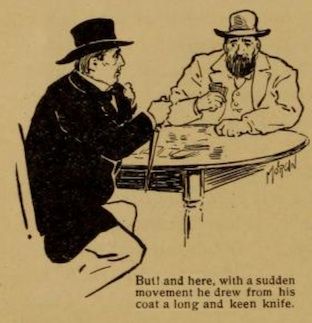
Among the steamboat poker anecdotes Edwards shares is a much repeated one involving James "Jim" Bowie, the famous pioneer perhaps best known for once literally having brought a knife to a gunfight.
Once attending a duel involving others, Bowie found himself in a deadly fight afterwards in which he stabbed to death a longtime rival with a large hunting knife. The story of the "Sandbar Fight" became so well known, the association between Bowie and his weapon of choice subsequently came to be reflected in the branding of the Bowie knife.
Bowie was also known for fighting in the Texas Revolution, losing his life while defending the Alamo in 1836. Just a few years earlier, as Edwards tells it, Bowie was taking a trip aboard the Orleans when a poker game took place involving three card sharps working as a team and an unsuspecting dupe from Natchez. The gamblers eventually took thousands off the young man �� every dollar he had �� and the man was so distraught nearly threw himself overboard if not for his new wife preventing him from doing so.
Bowie witnessed the man's behavior, and soon afterwards found the sharps and accepted their invitation to play poker with them. In a hand of five-card draw, a huge pot developed between Bowie and one of the others, worth more than $70,000 when the betting finally concluded. Bowie calmly showed his hand �� four kings with a ten �� then made a short speech.
"This is poker, and five cards constitute a hand. If you can show four aces, and no more than five cards in your hand, the pot is yours," Bowie said calmly.
"But...."
He stopped for a moment, drawing from his coat "a long and keen knife," then continued.
"If you have more or less than five cards I will kill you where you sit," he finished.
His opponent hesitated nervously, then tossed his hand into the muck to concede the pot. Bowie commended the man on his decision not to "disclose your hand with its four aces, because it had six cards." Bowie then found the young man and returned to him the thousands he had lost, making him swear never to play poker again.
Always Be Suspicious When Players Stand Pat
That theme of poker being potentially hazardous to a person's health is continued in the 1906 collection Stand Pat, Or Poker Stories from the Mississippi by David A. Curtis, one of a few poker-related titles penned by the journalist. In this case Curtis focuses on a group of card-playing characters inhabiting Brownsville, Arkansas, a Mississippi River town he had visited a few decades before.
The book reminds us that while poker was, as Edwards notes, constantly being played on the steamboats themselves, the many ports at which the boats stopped also became poker hot spots. Over the course of 20 stories originally published in the New York-based newspaper The Sunday Sun, Curtis describes the card-related adventures of Long Mike, Stumpy, Gallagher, the one-eyed man, and a varied supporting cast as they match wits with each other and a series of opponents either fresh off steamboats or waiting to depart.
Some of the stories in Stand Pat are light-hearted, such as an early one in which the featured quartet get involved in a hand of draw poker in which each is dealt a huge starter, inspiring them "to take off the limit" and raise the stakes. After the draw all four are so enthused by their hands every one of them decides to wager every cent in his pocket.
Their hands? Long Mike shows five aces, Stumpy a full house (kings full of aces), and Gallagher has four jacks �� "all red." While the one-eyed man doesn't show his hand, he laughs with knowledge of what the problem is.
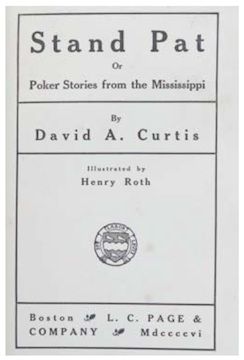
They were playing with a Pinochle deck �� a double deck, actually, which explained the preponderance of aces and face cards. "It's a game the Dutchmen play in the East," explained the one-eyed man. "I've heard of it, but I've never seen it played. But it does give a man good poker hands, doesn't it?"
Other stories are less full of mirth, including one shortly thereafter in which the one-eyed man loses his life after a visitor shoots him dead following the discovery of marked cards. Indeed, the source of intrigue �� and conflict �� in most of the tales is the gradual discovery of cheating, initially only suspected, then finally proven with varying degress of violence following thereafter.
Decks are stacked, cards dealt from the bottom, hidden cards accessed surreptitiously from pockets, partners look over shoulders and transmit signals, and six-card hands are dealt, among other transgressions. Long Mike is nearly drowned in the nearby river during another fight, and Gallagher gets shot in the head ("But the bullet had glanced" only). Visitors stopping by Brownsville having come off the Rosa Lee, the Creole Belle, the Natchez, and other steamboats accrue numerous injuries as well.
All in all, poker is presented as a highly dangerous pastime, and Curtis has his characters intersperse some reflections on the game's reputation in between hands. "I don't know what the reason is, but poker don't 'pear to be respected, now, like it used to be," opines one player.
Curtis leaves unanswered the question of whether poker is the cause of trouble or just a context in which man's violent tendencies find ready expression. Regarding one of the fights, the narrator explains "it had broken out over a game of poker, but no man knew whether the smouldering embers of hatred had blazed up at a chance word, or whether some fresh spark had been kindled by the friction of the game."
The Honorable Gambler, Canada Bill
Finally, one other character we must mention before moving on from our survey of steamboat card games is William "Canada" Bill Jones, whose reputation as a hustler and "confidence man" was supported primarily by his supreme facility at three-card monte.
Originally from northern England, Jones emigrated to Canada as a young adult, then eventually found a home on the Mississippi where he pursued a lucrative career fleecing all comers until his early death around 1880 at the age of 40. Much that is known about Canada Bill comes courtesy our friend George Devol who along with a couple of others formed a team with Canada Bill working in tandem up and down the nation's waterways.
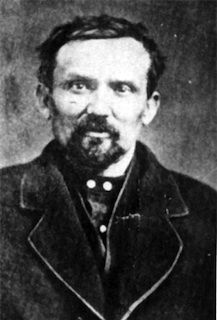
Devol introduces Canada Bill during the latter half of his 1887 memoir as "a character one might travel the length and breadth of the land and never find his match." Hardly an imposing figure, Devol describes him as "a medium-sized, chicken-headed, tow-haired sort of a man" who dressed poorly... and never weighed more than 130 pounds. He also looks slow-witted �� he "resembled an idiot" �� but that was all an act, a put-on that he was the sucker when in actuality it was whomever he could fool into making that mistake about him.
Jones often gets credited with several famous poker quotes, including the line "it's immoral to let a sucker keep his money" that Matt Damon's Mike McDermott attributes to Jones in 1998's Rounders �� a quote that likely also inspired the title of the 1941 W.C. Fields comedy Never Give a Sucker an Even Break.
Devol confirms that Jones "often said suckers had no business with money," a sentiment that might be said to form part of Canada Bill's personal ethical code. The other part was his overwhelming generosity, shown by a tendency to give away money to the needy nearly as fast as he took it away from those reckless enough to lose it to him.
"There never lived a better hearted man," writes Devol. "He was liberal to a fault. I have known him to turn back when we were on the street and and give to some poor object we had passed." One time, says Devol, he saw Jones "win $200 from a man, and shortly after his little boy came running down the cabin, Bill called the boy up and handed him the $200 and told him to give it to his mother."
As Devol outlived Canada Bill, he includes an epitaph to his former partner lamenting how he died penniless in Pennsylvania, with friends having to raise funds to pay for a funeral. Indeed, Canada Bill's charity seems partly to blame for his end-of-life destitution, although as Devol explains it, there was one other likely cause for the loss of his riches.
"While he was a great man at monte, he was a fool at short cards" or poker, says Devol. "I have known men who knew this to travel all over the country after Bill, trying to induce him to play cards with them. He would do it, and that is what kept him poor."
Conclusion
Devol goes on to defend Canada Bill against the unflattering portrait made of him by Mason Long in his moralistic 1878 memoir The Life of Mason Long: The Converted Gambler. After presenting Jones as "the most notorious and successful thief who ever operated in this country," Long suggests he "squandered his money very lavishly and drank himself to death." Devol vehemently refutes both charges as false, though he has a good idea of why Long and others are so ready to condemn card players.
"The public put all sporting men into one class, called gamblers; likewise they put all church members into classes and call them Christians, etc. There is as wide a difference between a true gambler and one who styles himself a sport, as there is between a true Christian and one who puts on the cloak of Christianity to serve the devil in."
"There is an old saying, 'Honor among theives,'" Devol adds, who then revises the maxim to read "There is honor among gamblers."
It's a difficult defense to make, however, given the complicated morality espoused by Devol, Jones, and other sharps �� that is, one that endorses cheating under certain terms and against certain targets but not others. Indeed, given the frequency of cheating and violence in stories of steamboat poker, it's easy to see how finer distinctions regarding the professional gambler's "honor" get washed away in all of these stories' wake.
From the forthcoming "Poker & Pop Culture: Telling the Story of America��s Favorite Card Game." Martin Harris teaches a course in "Poker in American Film and Culture" in the American Studies program at UNC-Charlotte.
Images (public domain): Eugene Edwards, "Jack Pots: Stories of the Great American Game," 1900 edition; David A. Curtis, "Stand Pat, Or Poker Stories from the Mississippi," 1906 edition; William "Canada Bill" Jones, ca. 1870.
Want to stay atop all the latest in the poker world? If so, make sure to get PokerNews updates on your social media outlets. Follow us on Twitter and find us on both Facebook and Google+!

